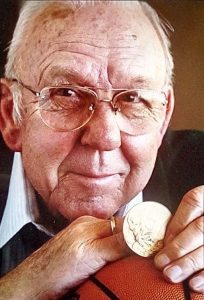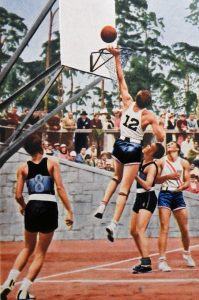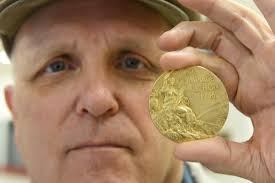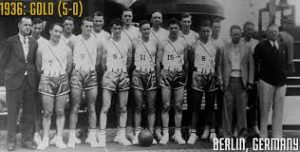The NBA Finals date back to 1947 (when they were known as the Basketball Association of America Finals) and the very 1st NCAA tourney was held in 1939. Olympic basketball competition is even older: it debuted as a demonstration event in 1904 and the men’s version became a medal sport in 1936, with the women finally getting their chance to go for the gold in 1976. The United States has dominated Olympic basketball competition from the start: the men have won 15 gold medals in the 18 tournaments they have participated in during the past 84 years, while the women have won 8 gold medals in the 10 tournaments in which they have competed during the past 44 years. Those of you who were looking forward to the 2020 Olympics opening ceremonies in Tokyo on July 24, 2020 will have to wait an extra 364 days, as the coronavirus caused a postponement until July 23, 2021. Due to the absence of college basketball since mid-March, HoopsHD’s Jon Teitel decided to fill the void by trying to interview as many prior Olympic players/coaches as possible so that you have something to read this summer while not watching the Summer Games. We continue our coverage by chatting with Oliver Fortenberry about his father Joe winning a gold medal in 1936. Today marks the 84th anniversary of Joe scoring a game-high 8 PTS to help team USA beat Canada 19-8 to win the 1st-ever Olympic basketball gold medal.
 (photo credit: mcphersonsentinel.com)
(photo credit: mcphersonsentinel.com)
Your father was born/raised in Texas: what made him choose West Texas A&M for college? After graduating from Happy High School they paid his tuition and were located right down the road. Times were tough but he got to play basketball, which he loved to do. He was born in a little town called Leo that does not exist any more and grew up on a farm. He later moved to the city of Joy and then back to Happy!
He was nicknamed “College Joe”: who gave him the nickname, and how did he like it? Nobody called him that when I knew him so the nickname did not stick. He was born in 1911 and was almost 40 when I was born. Everyone in Amarillo knew him and just called him Joe.
He was captain of team USA at the 1936 Olympics, which was the very 1st to include basketball: how big a deal was it at the time? It was a big deal here but was very controversial whether they would even get to go. Some college teams like LIU did not even play in the Olympic Trials. They played all over the country including Madison Square Garden. They played the AAU championships in Denver: when I lived there and people heard my last name they would ask me if I was related to him. His name was as big as LeBron James back then: people rooted for him even if he was on the opposing team. In Colorado back in the day if you were 18 years old then you could drink beer that was 3.2% alcohol. I remember watching the last episode of “The Fugitive” with a friend and drinking beer: when my friend’s parents got home they were unhappy…until hearing my last name!
Adolph Hitler tried to institute a rule that any Olympic basketball player taller than 6’1″ was disqualified but the Olympic Committee overruled him, so instead Hitler made the basketball teams play outside on dirt courts: how did your dad feel about getting picked on by Hitler (and living to tell about it) as part of a team nicknamed “the tallest team in the world” that had an average height of 6’5’’? From what I gather that is not right: it was the FIBA people who wanted to institute a 6’2” height limit and the German Olympic Committee thought that it would be better to play outdoors…which was fine until it rained during the final game! The main problem was the “Berg” basketball, which was lightweight and would move around in the wind. I believe the FIBA official was R. William Jones, who was the same guy who ordered 3 seconds added to the clock at the end of the controversial 1972 gold medal game: it seems like he was gunning for the US for most of his career!
He scored a game-high 8 PTS in the 19-8 win over Canada in the title game that was played outdoors in wind/rain on a muddy clay court: what did it mean to him to represent his country, and what did it mean to him to win a gold medal? He just loved the idea of it. He did not consider it that big a deal until people came around to interview him every 4 years starting in the 1980s. He was as humble as you could be and kept his medal in a shoe box: he was not a self-promoter. Pop said they were all captains: it was not that big a deal. He was the high scorer: there were 14 guys on the roster but they could only suit up 7 for each game. The Universal team played a steady/controlled style while the McPherson team was the 1st helter skelter type of team. He was rankled that only the 7 guys in the gold medal game got to stand on the podium and receive a medal: it was only later that medals were created for the entire team. There were no further Olympics until 1948 so there was no holdover from 1 to the next, but if they held it in 1940 then I think that the US would have won another gold medal. After coming back from WWII there was a new crop of younger guys but he played 1 season for Lee Tires.
He was a 3-time AAU All-American and won AAU national titles with the Globe Refiners in 1936 and the Phillips 66ers in 1940: was he considered 1 of the best players of his era? He was considered the best big man of his era. There was a guy named Ace Gruenig who won more titles but Pop was better: I asked him about it and he did not puff himself up. When they 1st opened the Hall of Fame they inducted 8-10 AAU players (including Ace) but they have not put any more AAU guys in since then. He should be in there, as should his team: hopefully he will get in next year. He invented dunking/goaltending and won the very 1st gold medal. They had to get rid of the center-jump after each basket because he always won the tip. There was a running clock back then so they scheduled a 40-minute game each hour with very little turnaround time: that is another reason the scores were so low. Pop played 2 games at the Olympics: he scored 21 PTS vs. the Philippines and 8 PTS vs. Canada in the gold medal game. The 66ers ruled the roost during the 1940s and won something like 8 out of 11 AAU titles and dominated the Olympic teams in 1948/1952, but faded away after the NBA started paying higher salaries.
According to a 1936 New York Times article by Pulitzer Prize-winning sports reporter Arthur Daley, your 6’8” dad was credited with being the 1st person to ever dunk a basketball in an organized game: how did he come up with the idea, and how was he able to still dunk at age 55?! I have never shared this story before. There was a hoop at the barn in Happy where he would practice layups. He noticed there was a warped/loose board on 1 side of the barn so he would just lay the ball into the hoop, and that is how it started: it was just kind of an accident. His 1st dunk during a game was in college: his coach told him to never do it again because it was not elegant nor a part of the game so he did not do it again until after graduating. The McPherson teams usually did it during warmups as an intimidation factor: my dad, Willard Schmidt, and 1-2 others. It was not as violent as when Darryl Dawkins was shattering backboards a few decades later. The reason he could still do it at 55 was because he was a great athlete. He was fleet of foot and had a huge wingspan: he had a standing reach of 9’! I saw him do it in our driveway after I was trying to dunk a ball myself. He was not a lumbering big man: he boxed, ran the hurdles, and even played tight end. He was a bare-knuckles prizefighter: each town would have their champ competing against the champs from other towns. A champ from Clayton came down to Happy 1 time and was hooting and hollering because my dad was not present. My dad finally pulled up and was exiting his car when the guy from Clayton sucker-punched him. Pop swung back while still in the car, cold-cocked the guy, told the promoter to give his money to his mother, and then drove off. My cousin heard that story from someone who was there. He had the biggest fists of anyone you have ever seen: I measured them once and they were 15”. His wrists were almost 10” around and were solid bone.
In 1957 he was inducted into the Helms Amateur Basketball Hall of Fame: where did that rank among the highlights of his career? He liked it and was glad that it happened. I am also trying to get him into the Texas Hall of Fame. I filled out the form and they were all excited but he did not get in.
In 2017 you brought his gold medal to the PBS show “Antiques Roadshow” where it was appraised at $100,000-$150,000: where do you keep it, and how much money would someone have to offer you to sell it? Before I did that I kept it in a box under my bed…but now it is in a safe deposit box at a bank in Amarillo! It is not simply mine to sell because I have 2 sisters: we would need at least $500,000 to send everyone’s kids to college. It would take some life-changing money to make me sell it.
He passed away in 1993: when people look back on his career, how do you think that he should be remembered the most? As the dominant player of the 1930s and 1 of the true game-changers. He invented the dunk/goaltending but was humble about it: he ought to be in the Hall of Fame. I never got to see him play: his final game was in 1949 at a tourney in Amarillo. I did get to watch him shoot: I am sure that he missed but I never remember it. He could make hooks with either hand out to the FT line and set shots out to 20’. All of his shots went in with a lot of authority, almost like a dunk. He had an incredible shot and would shoot his FTs underhanded like Rick Barry.
For more info about the 1936 US Olympic team check out “Sporting Labor in the Hollywood Studio System: Basketball, Universal Pictures, and the 1936 Berlin Olympics” by Professor Alex Kupfer at: https://cinema.usc.edu/spectator/35.2/2_Kupfer.pdf and “Netting Out Basketball 1936” by Rich Hughes at: www.amazon.com/Netting-Out-Basketball-1936-Remarkable/dp/1770679707



